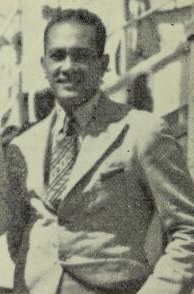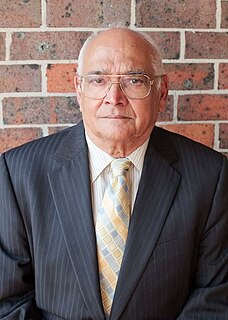Related Research Articles

Ratu Sir Edward Tuivanuavou Tugi Cakobau was a Fijian chief,soldier,politician and cricketer. He was a member of the Fijian legislature from 1944 until his death,also serving as Minister for Commerce,Industry and Labour and Deputy Prime Minister. During the 1940s he made two appearances for the Fiji national cricket team.
Kunwar Bachint Singh was an Indo-Fijian teacher and politician. He arrived in Fiji in 1927 as a teacher for the Arya Samaj but his association with Vishnu Deo led him to play an active role in aggressively promoting the Arya Samaj and finally into politics. He was elected into the Legislative Council as a protégéof Vishnu Deo but after the election took an independent stance opposed to the wishes of the majority of the Indo-Fijians. He supported nominated rather than elected representation,actively supported the war effort and even attempted to set up a farmers union opposed to a number of existing unions. The Government rewarded him for his loyalty by nominating him into the Legislative Council three times,appointing him as a Justice of the Peace and as the first Indo-Fijian member of the Executive Council.
Ayodhya Prasad Sharma was an Indo-Fijian farmers' leader and politician. He formed the most successful farmers' union in Fiji and forced the Colonial Sugar Refining Company to make concessions to farmers after 60 years of total control over Fiji's economy. However,other Indo-Fijian leaders formed rival unions and his initial success was not repeated. He also served as a member of the Legislative Council between 1953 and 1959.

James Madhavan was an Indo-Fijian politician. He was a member of the Legislative Council and House of Representatives for most of the period between 1947 and 1973 and had two spells in the Executive Council.

General elections were held in Fiji between 17 April and 4 May 1963. For the first time,women and indigenous Fijians were given the right to vote alongside the male European and Indo-Fijian population.
Andrew Indar Narayan Deoki was an Indo-Fijian statesman who served his community as a social and religious leader,soccer administrator,member of the Legislative Council and Senate in independent Fiji and as Attorney General.

Muniswamy Mudaliar was an Indo-Fijian politician who was a member of the Legislative Council from 1932 to 1937. In 1933 he became Fiji's first Indo-Fijian Justice of the Peace.

Karam Chand Ramrakha was a former Fiji Indian lawyer,union leader and politician,who served in colonial Fiji's Legislative Council and independent Fiji's House of Representatives from 1966 to 1982.
The number of Fiji Indians that could be elected to the Legislative Council was fixed over the years as follows:

General elections were held in Fiji on 22 March and 8 April 1905.

Sir John Maynard Hedstrom was a Fijian businessman and politician. He served as a member of the Legislative Council for over 30 years. Alongside Robert Crompton,Henry Marks and Henry Milne Scott,he was one of the 'big four' that heavily influenced the Fijian economy and political sphere in the first half of the 20th century.
John Percival Bayly was a Fijian businessman,politician and philanthropist.
Sir Thomas William Alport Barker was a Fijian newspaper owner and politician. He owned the Fiji Times for several decades and was a member of the Legislative Council for over 20 years.
Sir Hugh Hall Ragg was a Fijian businessman and politician. He served as a member of the Legislative Council between 1926 and 1950.

Sir Henry Marks was an Australian-born Fijian politician,serving as a member of the Legislative Council of Fiji for over twenty years. Alongside Robert Crompton,John Maynard Hedstrom and Henry Milne Scott,he was one of the 'big four' that heavily influenced the Fijian economy and political sphere in the first half of the 20th century.

Harold Brockett Gibson was a New Zealand-born Fijian solicitor and politician. He served as a member of the Legislative Council and House of Representatives in three spells between 1937 and 1972. He also represented Fiji in the lawn bowls competition at the 1950 British Empire Games.

Frederick Charles Clapcott was a New Zealand settler in Fiji. He served in the Legislative Council between 1917 and 1923,and represented Fiji at the 1938 British Empire Games.
Charles Wimbledon Thomas was a Fijian businessman and politician. He was a member of the Legislative Council three times between 1911 and 1923.
Robert Crompton was a British lawyer and politician in Fiji. Alongside Henry Marks,John Maynard Hedstrom and Henry Milne Scott,he was one of the 'big four' that heavily influenced the Fijian economy and political sphere in the first half of the 20th century.
Major William Edmund Willoughby-Tottenham was British army major and later a politician in Fiji,where he served as a member of the Legislative Council in two spells between 1922 and 1937.
References
- 1 2 Personal items The Bulletin , 1 February 1933, p13
- ↑ Fiji Legislator Pacific Islands Monthly , March 1933, p11